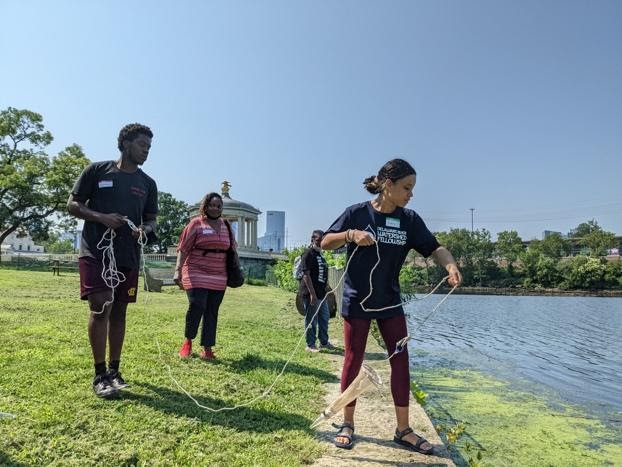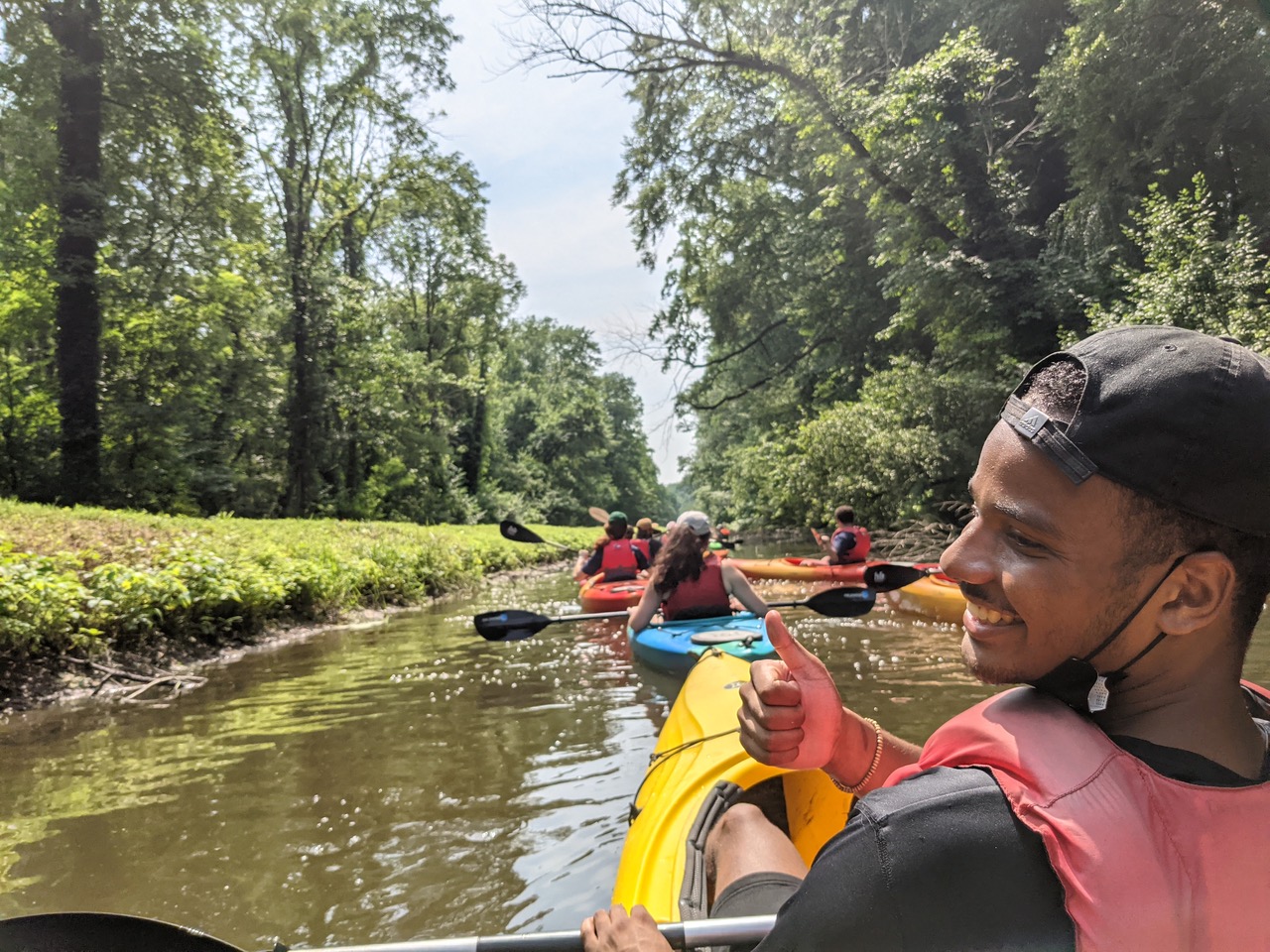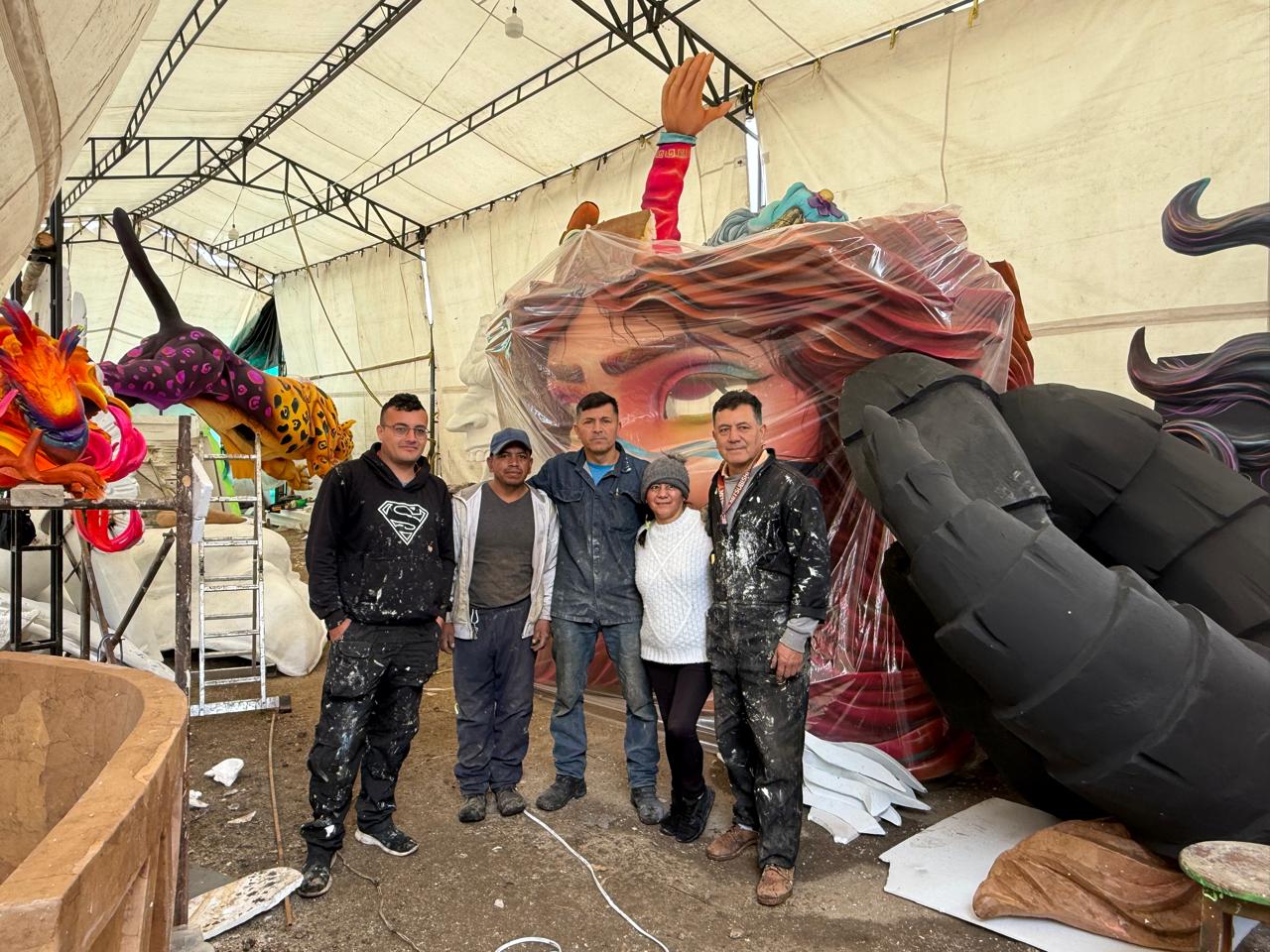
Delaware River Fellows Raise Environmental Awareness In Their Communities
The Delaware River Fellows Program gives young adults the opportunity to get valuable, first-hand experience in habitat conservation and environmental…

Xzy-Nayé Campbell, Fellow at the Pocono Environmental Education Center, explores the Delaware Canal with The Watershed Institute Fellow Mafanta Swaray/Alliance for Watershed Education.
Janniry Cabrera Belen’s favorite memory is climbing trees with her cousins in the Dominican Republic and basking in the beauty of the nature around her. Janniry is bringing that feeling of “peace and pure happiness” to the Lehigh Gap Nature Center this summer as a Fellow in the Delaware River Fellows Program. By building a native plant demonstration garden that tells the story of the Center’s Superfund restoration work through bilingual displays and signage, she hopes to attract more Spanish speaking visitors to the Center.
Adriana Amador-Chacon’s favorite memory of nature is exploring the woods and creek near her home in Tennessee as a child. Fascinated by the critters, she and her friends once caught a snapping turtle and took a selfie with it before releasing it into the creek. Adriana is bringing that same fascination and love of nature to the New Jersey Conservation Foundation Gateway Park in Camden this summer as a Fellow in the Delaware River Fellows Program. In an effort to attract more of the local community to the beautiful green spaces in Camden, Adriana is hosting a series of art classes that combine painting lessons with information about stormwater management and the importance of clean, healthy water. An exhibition at the end of the summer will showcase the art.
The Delaware River Fellows Program gives young adults the opportunity to get valuable, first-hand experience in habitat conservation and environmental education in the Delaware Watershed. This summer, 30 Fellows are working on individual capstone projects focused on environmental issues and engaging local communities. They gain knowledge of conservation and share their passion with others, encouraging the enjoyment, use, and care of the natural areas in the watershed.
Janniry, Adriana and the other Fellows are paid to work on their projects at the 23 environmental education centers in PA, NJ and DE that comprise the Alliance for Watershed Education (AWE). AWE seeks to intentionally engage diverse communities, especially those who have been historically left out of conversations about protecting our shared environment. It promotes equitable access to its Centers and fostering socially responsible practices that will result in a healthier natural environment.
Jahya Gale-Cottries, a Fellow at the John Heinz National Wildlife Refuge understands the importance of building community in the neighborhood around the Refuge: “Forming a connection over a common interest like nature can really strengthen and bond a community.” By encouraging local residents to help clean litter from the waterways, Jahya will teach them about the environmental harm caused by illegal dumping.
Robin Irizarry, Fellowship Coordinator for the Alliance for Watershed Education (AWE), is excited to work with a full cohort of Fellows this year: “Last year the Fellowship program was limited due to the pandemic. While we can’t say things are back to normal, we are incredibly grateful for a cohort of 30 Fellows working at all of the AWE environmental education centers this summer. These young people are eager to learn all about restoring and protecting their local waterways and to share that knowledge with their communities.”
The Fellowship Program, now in its fifth year, builds on a growing national momentum for more diversity and equity in environmental leadership and enjoyment of the outdoors. Most of the AWE centers are in urban areas and many of the Fellows come from nearby BIPOC communities that have been historically underrepresented at the centers and in the broader environmental movement. The Fellows gain invaluable conservation and environmental experience that may not otherwise have been available to them.
Irizarry says, “Racial equity and representation in the field of environmental conservation has been a priority of the Fellowship program since its beginnings in 2017. In reflecting on the events of 2020, (AWE) has come to recognize that the Fellowship program is one place where we can be the most intentional in our efforts, dialing in our recruitment efforts to present these opportunities first and foremost to community members around our environmental centers, in communities that have historically been excluded from conversations around watershed protection.”
The 2021 Fellows are passionate about the environment and are working hard to connect neighborhoods and groups of people with nature across the Watershed.
MEET THE FELLOWS:
Camden, New Jersey
- Lesslie Montiel, Fellow at Camden Children’s Garden, is teaching the local Spanish-speaking community about the importance of insects, particularly native pollinating insects, in a healthy watershed. Bilingual staff and resources will encourage participation in the construction of pollinator houses that will be installed at community gardens throughout Camden.
- By leading kayaking trips and photographing the trash and waste in the Delaware River with an underwater Remotely Operated Vehicle (ROV) that he is constructing, Anthony Lara, Fellow at the Camden County Environmental Center, hopes to educate the local community about how litter affects the health of a river
- Adrianni Herrera and Priscilla Rios, Fellows at The Center for Aquatic Sciences and New Jersey Natural Lands at Petty’s Island, respectively, hope to expose more Camden residents to the Delaware River by leading live and virtual educational kayaking tours around Petty’s Island and the Cooper River.
Trenton, New Jersey
- Mafanta Swaray and Edgar Rivera, Fellows at The Watershed Institute, are designing mini butterfly gardens (“butterfly barrels”) in Trenton neighborhoods to enhance the urban environment with native pollinator plants. Mafanta and Edgar will also host a program where Trenton residents can learn more about butterflies and receive supplies to build their own mini butterfly gardens.
- Recognizing that many people in the Trenton area live close to the Delaware River but don’t have the opportunity to interact with it, Fabio Yales, Fellow at the D&R Greenways, Tulpehaking Nature Center is educating residents about the history and ecological importance of the river. Using his storytelling skills and passion for photography, he is creating virtual kayak trips to encourage the local community to participate in the Center’s growing kayaking program.
Wilmington, Delaware
- Saada Wing, Fellow at First State National Historical Park and The Nature Conservancy, is creating a trivia game to help people of all ages understand the importance of the Delaware River Watershed. Saada will be hosting a live version on July 31st at Brandywine Creek State Park, where she will be spinning a game wheel and giving out prizes. Visitors will also be able to play the game on their own at any time.
- Maria Dupnock, Fellow at the DuPont Environmental Education Center, is developing a toolkit for the Center’s Trail Ambassadors (select Wilmington youth who are trained to educate the public). It will include a pocket field guide on common wildlife species and local fish as well as engagement tips. The toolkit will enrich the Ambassadors’ knowledge and assist in the delivery of their public education programs.

RELATED CONTENT
Pictured: Maria Dupnock, Dupont
Philadelphia, Pennsylvania
- Using 21st century tools, Sandy Phuong and Brandon Chaingam, Fellows at the Discovery Center, hope to attract and engage more visitors to the Center. Sandy is expanding the Center’s social media platforms to attract more young people in the Strawberry Mansion community, while Brandon is developing a series of QR codes equipped signs to help visitors identify and learn about native plants in the garden using their cell phones.
- Andrew “Drew” Atkerson, this year’s Senior Fellow is helping pilot a new mentorship component of the Fellowship Program to connect past and current Fellows with environmental professionals who share similar life experiences, cultural and racial identities, interests, and professional goals.
- Brooklyn Clayton, Fellow at Bartram’s Gardens, is creating themed “Garden Games” to bring together community members and teach them about the Schuylkill River through a series of fun and educational activities, including biking and kayaking competitions.
- To educate the local community about the impacts of illegal dumping in the waterways, John Heinz National Wildlife Refuge Fellow Jahya Gale-Cottries is engaging other AWE Fellows and the community to help remove tires from the Darby Creek and Refuge through her Tire Round Up Program. She hopes that the education and engagement will result in less illegal dumping and more appreciation and care for local waterways.

- Amira Parker and Jon'avin Freeman, Fellows at the Fairmount Water Works, are developing an educational activity book for high school students on watersheds and river health. The activity book will be offered in English and Spanish and will be used as a tool to engage high school students in a local Hispanic high school community.
- Environmental racism and water justice are the focus of Independence Seaport Museum fellows Tamiria Elliott and Molly Flanagan, who are creating lesson plans for the Museum’s River Ambassadors (high school students who lead interactive public programs at the Museum). The lesson plans will enhance the Ambassadors’ knowledge and provide a framework for public programs at the Museum. The Fellows have also drafted a land acknowledgement for the Ambassadors to use in helping the public recognize and honor the indigenous Lenni Lenape people who have inhabited and protected the area since long before European settlers arrived in the United States.
- Vary J. Soth, Fellow at Cobbs Creek Community Environmental Education Center, is engaging local teens to help measure the health of the water in Cobbs Creek and working to recruit local community members to become part of a team that will monitor environmental issues in the area.
- Sharing information about how to forage local edible plants is a tool for engaging community residents in park resources. MyKyah Vessels, Fellow at the Tookany/Tacony-Frankford Watershed Partnership at Tacony Creek Park, is teaching visitors how to identify plants and safely forage in Tacony Creek Park by creating blogs and factsheets, and leading two walks, to demonstrate these special yet accessible natural assets.
- Jamel Shockley, Fellow at the Schuylkill Center for Environmental Education, is helping to revitalize the Center’s gardens by removing weeds and invasive plants and repopulating with native plants. The hope is to create an engaging dialogue around the impacts of invasive plants and the benefits of switching to a native plant palette.
- Julianna Roseo, Fellow at the Schuylkill Center for Environmental Education, is using “pedal and paddle” events to highlight the environmental dangers and impacts of plastic pollution and to encourage people to cut back on single-use plastics.
Reading, Pennsylvania
- Through plant potting classes, Kamar Bennett, Fellow at the Berks Nature Center, is teaching the local Reading community about how vegetation benefits a watershed. Kamar is also introducing the community to local trails and parks in and around the Center that they may not have been aware of. His goal is to show that nature is always close by – in a park around the corner or in a pot on your front porch.
Around the Delaware River watershed:
- Janniry Cabrera Belen and Alexis Matos are creating new educational outreach tools centered around the Lehigh Gap Nature Center’s (LGNC) native plant gardens. With bilingual (English/Spanish) signage, Janniry will tell the story of LGNC’s Superfund restoration work. She is also creating bilingual videos focused on watershed stewardship and is hosting Nature in Art classes. Alexis is developing a field guide to the 150+ species of native plants surrounding LGNC’s visitor center with information highlighting the sensory appeal of each plant, hosting virtual native plant lectures, creating plant spotlight YouTube videos, and designing signs for the gardens and trails.
- Gabriel Jacobs, Fellow at the Bristol Marsh - Heritage Conservancy, hopes to introduce members of the Lower Bucks County LGBTQ+ community to environmental conservation by creating a safe space to learn how to become environmental stewards. They are highlighting the restorative power of nature by hosting picnics, nature walks, and mindfulness activities to promote emotional well-being and to help connect people to the natural spaces in their community.
- Brian Frey and Xzy-Nayé Campbell, Fellows at the Pocono Environmental Education Center (PEEC), are hosting ‘PEEC Day’ activities in the East Stroudsburg area to establish a stronger relationship between the community and their Center. Through their efforts they hope to bring a bit of the Pocono Environmental Education Center experience (hands-on, nature-themed activities and crafts) to the libraries and parks in order to inspire community members who’ve never visited PEEC to come out and experience nature rich trails with them.
- Gilliam Lorenzo, Fellow at the John James Audubon Center at Mill Grove, is helping establish native plant gardens at three local schools to increase biodiversity in the area, help restore healthy soils, and prevent river pollution. Working closely with Centro de Cultura Arte Trabajo y Educacion (CCATE) in Norristown, she is engaging Spanish speaking students, teachers and families to enhance their understanding about ecological restoration.

Andrew Atkerson, Senior Fellow on the Delaware Canal with other 2021 Fellows
The Delaware River Fellows Program is funded by the William Penn Foundation, which has supported five cohorts and more than 120 individual Fellows, many who have gone on to continue working in the environmental field.
The Alliance for Watershed Education of the Delaware River is a regional initiative of 23 partnering environmental education centers located along waterways in Delaware, New Jersey, and Pennsylvania. The Delaware River watershed is a 13,500-square mile system which provides clean drinking water for 13 million people. Through aligned communications, joint programming and shared best practices among the centers, the Alliance works toward inspiring a healthy Delaware River watershed with diverse communities and people empowered to sustain it. For updates about AWE activities, sign up for a newsletter and learn more about the Fellows and their projects on AWE’s Facebook page and on Instagram.










LEAVE A COMMENT: